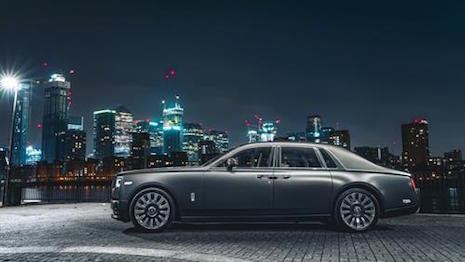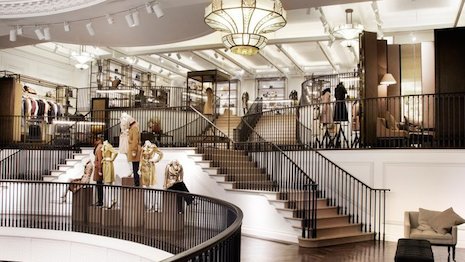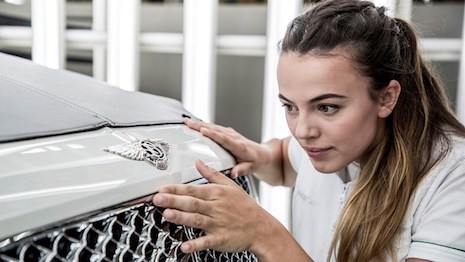 Luxury automakers account for almost two-thirds of British luxury sales. Image credit: Rolls-Royce
Luxury automakers account for almost two-thirds of British luxury sales. Image credit: Rolls-Royce
The British luxury business is growing at more than double the rate of the United Kingdom’s overall economy, a promising sign as uncertainty around Brexit continues.
According to a new report from Walpole, Britain’s luxury business has achieved almost 50 percent growth in the four years from 2013 to 2017. Propelled by exports, tourism and manufacturing, the luxury industry is now worth 48 billion pounds, or $60.9 billion at current exchange, to the U.K.’s economy.
“These figures demonstrate the exceptional contribution British luxury makes to the U.K. economy and to the reputation of brand Britain worldwide,” said Helen Brocklebank, CEO of Walpole, London.
“Few other business sectors can demonstrate growth of nearly 50 percent in just four years and, against a challenging political backdrop,” she said. “This is a sector that continues to demonstrate a commitment to investing in U.K. manufacturing and creating sustainable employment across the country.”
British boost
In 2017, the British luxury sector’s exports reached 38.5 billion pounds, or $38.8 billion, up from 25 billion pounds, or $31.7 billion, in 2013. The leading export markets for British luxury goods are the European Union, North America and China.
Since 2013, the British luxury industry has grown 9.6 percent per year on average, compared to the U.K.’s overall economic growth of 4 percent.
Burberry’s swanky London store that attracts visitors from around the world. Image credit: Burberry
British luxury goods encompass a wide breadth of categories, including apparel and accessories, watches and jewelry, fine wines and spirits and car manufacturing.
Luxury car sales accounted for 31.4 billion pounds, or $39.8 billion, in sales in 2017, almost two-thirds of all luxury sales. More than a third of total sales from U.K. automakers are high-end vehicles.
Apparel is the second most valuable luxury industry in Britain, contributing sales of 5.8 billion pounds, or $7.4 billion, in 2017.
Although luxury hotels had more modest sales of 1.6 billion pounds, or $2 billion, in 2017, tourism is crucial to the British luxury industry.
Affluent travelers spent an estimated 4.5 billion pounds, or $5.7 billion, on luxury goods in the U.K. during 2017.
Walpole estimates that about 70 percent of British luxury businesses, including Bentley Motors and Burberry, manufacture at least part of their products domestically, benefiting the economy while emphasizing the brands’ appreciation of craftsmanship.
Luxury businesses currently employ 156,000 people in the U.K., both directly and indirectly. Many British luxury brands, including automakers, differentiate themselves by investing in apprenticeship programs for a highly skilled workforce.
Bentley fosters talent in students and apprentices. Image credit: Bentley
While Walpole’s report only includes data through 2017, British brands have continued to find success.
In 2018, British automaker Rolls-Royce celebrated its highest ever annual sales. The Americas kept its position as the largest region in sales, but all markets saw year-over-year growth.
In tandem with its sales growth, the automaker also broke a record with its apprentice intake, with the highest number of individuals in the program at 23. In addition, Rolls-Royce added a total of 200 new jobs (see story).
Brexit and business
Walpole estimates that in 2019 alone, British luxury could see sales between 51.1 and 57 billion pounds, or up to $72.3 billion at current exchange. However, this forecast is highly dependent on the outcome of Brexit.
Parliament has struggled to pass a Brexit deal, which most recently resulted in the resignation of Prime Minister Theresa May (see story)
Some brands are already feeling an impact from the chaos associated with Brexit.
Three-quarters of British automakers believe a “no deal” split from the E.U. would have negative repercussions across the industry. According to a member survey from the Society of Motor Manufacturers and Traders, one in five automakers have already seen a loss in business (see story).
Additionally, British fashion label Burberry missed expectations for the third quarter ended Dec. 29, and stressed the importance of avoiding a no-deal Brexit policy (see story).
More than 40 percent of British luxury goods are exported to the E.U., compared to 23 and 11 percent to North America and China, respectively.
According to a prior report from Walpole, British luxury could lose almost $9 billion if the United Kingdom leaves the E.U. without any sort of deal. Additional tariffs, taxes and regulation differences between the U.K. and the E.U. may cause a fifth of British luxury business to be at risk (see story).
“We look forward to continuing this kind of robust growth, not least in exports, but the threat of exiting the E.U. without a deal remains and would cost British luxury businesses 6.8 billion pounds in lost export revenues,” Ms. Brocklebank said. “Now is the time for policy makers to provide distinct sector recognition and to guarantee a suitable framework to protect the growth of the U.K.’s high-end creative and cultural industries.”

